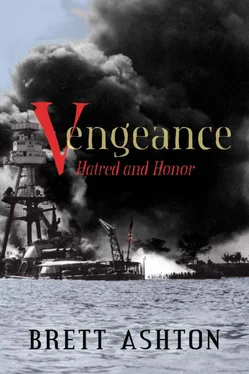“What’s that got to do with us?” said Flaherty.
“Well, ensign, we were supplying them with materials and fuel, which they were supposed to be using for industry to build the economy of their country. Instead, they have been using them to build weapons to attack the Chinese. They’ve been notoriously brutal, even for war, so we cut them off. I’m guessing they will be missing the oil most of all. They won’t be able to fight or run their industry for long without it.”
“But even if they start a war with us, that wouldn’t get us to start giving oil to them again,” the Ensign persisted. “So what would that gain them?”
“I would think, young Ensign Flaherty, if you study the maps and resources of the world, it would become obvious. Can anybody here tell the young Ensign where the Japanese could get the fuel for their war machine other than from us?” I asked.
“The Russians or the Dutch East Indies,” said Alexander.
“Very good but which is most likely?” I asked.
“The Dutch East Indies,” Alexander answered.
“Why?”
“Well, there is no love lost between the Japs and the Russians because of the Japs’ alliance with Germany. The Russians have the resources to fuel the Japs. But the Japs would have to take the resources by force from the Russians. Even so, the Japs are not strong enough to win against the Russians in open combat, which leaves the Dutch, who are currently part of occupied Europe, so they are less of a challenge,” answered Lewis.
“Still, I don’t see what that has to do with us,” said Flaherty.
“Can anyone remember their eastern geography and tell the young ensign what lies between Japan and the Dutch East Indies?” I asked.
“Oh!” he said. “The Philippines!”
“Yes, not only the Philippines, but the American Territory of the Philippines,” I added. “And do you think for one minute the Samurai warlords of the Empire of Japan are going to let us operate a major base right in the middle of their war, unmolested, while we are supplying the allies of the Dutch with weapons?”
“I see your point,” he said. “So you think they will attack the Philippines?”
“That would seem to be most logical at first, but then they would have to contend with us afterwards. I can’t begin to guess how they would do that, but they have had a lot of practice actually fighting a war, whereas we haven’t. Also to our disadvantage is our lack of aircraft carriers. Our three in the Pacific and four in the Atlantic versus their eleven, which they could focus almost entirely on us.
“At this point, the larger part of our entire naval strategy is based on battleships. I wonder just how well these old ships would stand up to a full-fledged air assault. It’s a good thing a lot of new ships are being built, especially carriers. It would be very comforting to have a lot of planes in the sky to cover our exposed topside. We do have some guns to shoot back with, but I think it would be a good thing to add more anti-aircraft guns to these old battlewagons. The new five-inch guns are supposed to be very good at longer ranges, but nothing will really reach high enough to effectively protect us from air attack, except our own planes.”
I was thinking about the attack of the British against the Italian fleet at Taranto Bay in November of 1940. Several Italian ships were taken out by planes with torpedoes. The battle provided a fundamental shift of power in the Mediterranean toward the British. It was becoming increasingly obvious that ships were no longer safe from determined attackers from the sky. I decided not to bring this point into the conversation at the time because some parts of it were still classified.
“The current fleet buildup couldn’t hurt with promotions, either. War or no war, a larger navy means more room to move up. If a war broke out now, most officers with any experience would move up in ranks and out to commands of their own. Things change very rapidly in war, but I wouldn’t want a war to break out just for a few more stripes,” I added, thinking promotions and pay raises were coming a little too slow for a man with a wife and three kids.
“But a little closer to the here and now,” I said, turning to the reason for our meeting in the first place, “are all of our respective departments ready for the big inspection this afternoon?”
The four division officer lieutenants responded in turn with their reports. The projectile and powder inventories were restocked the day before after being somewhat depleted from the target practice over the preceding week. The barrels and breaches of the ship’s big fourteen-inch main guns were cleaned and lubricated per navy specifications. The hatches were open to allow the inspectors easy access to the magazines with fire-watches posted at every single one of them, just in case. Compartments were clean, and gear was stowed for combat. And all of the cursed mounds of paperwork the United States Navy required was filled out and properly filed.
I never really much liked that part of the meetings with my officers. It was a boring routine and seemingly unnecessary. But the captain, or “Old Man,” as battleship crews were so fond of calling him, required his reports, and the admirals, in turn, required them from the captain. I’m sure none of it could have been made official without a whole lot of officers sitting around drinking coffee served by ensigns, as if none of us could have really used the time any better. And I’m almost certain the Japanese or Germans would not check our paperwork to make sure all of the blanks were filled in before attacking. It was just another one of those annoying little things we had to do in the military.
After the requisite reports were reported, I brought the discussion to the part of the weekly meetings I enjoyed the most. “Now that we all have our acts together, what condition is this ship in, in terms of overall combat readiness?” The other officers were never surprised at being quizzed by me like this. In every meeting I had with them, it was the signal that I had become tired with the mundane business and wanted to push their knowledge a little further than the status quo of running a ship. I would usually challenge them about some seemingly obscure design feature or piece of history about the ship. The Okie , being fairly old, had a lot of interesting design changes over the years. In fact, looking at some of the older pictures you could barely even tell it was the same ship compared to its current configuration, a fact that the young ensign found out to his embarrassment several weeks ago.
Evidently, a little betting pool had begun some time ago between themselves about which of the ship’s systems I would discuss at these meetings. I could usually tell by reading the expressions on their faces who had won as soon as I asked the question, but this time I had apparently thrown them a curve by asking for the overall battle readiness of the ship instead of a specific system. I couldn’t participate in their game for obvious reasons, but I wasn’t about to stop it, either. After all, at least they were thinking about the ship’s systems as a result, and it had the added benefit of adding some “all in good fun” to shipboard life. With a little bit of self satisfaction at having stumped them, I decided I would eventually narrow the discussion to the counter flood systems.
“Well, the main guns are ready,” answered Alexander.
I suspected he was trying to get me to narrow it down to the guns so he could win the bet.
“Yes, I know and expect that from a group of fine officers such as yourselves, but what about the rest of the ship?” I asked again.
“Overall?” asked Flaherty. “Why would we in the gunnery division need to know that?”
Читать дальше












